|
|
|
Sort Order |
|
|
|
Items / Page
|
|
|
|
|
|
|
| Srl | Item |
| 1 |
ID:
148066
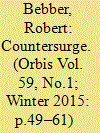

|
|
|
|
|
| Summary/Abstract |
Many experts raise concerns about the “rise of China” and the potential threat it presents to American interests. Indeed, the recent strategic pivot announced by U.S. leaders is designed to address these concerns. Yet what we are likely to see is not a rise of Chinese power, but a surge—a temporary situation of perhaps twenty to thirty years. Demographic, economic, and political factors will all combine to create a ceiling on Chinese power and ultimately cause it to decline. The United States needs to develop military capabilities that will prepare it for the coming strategic window, along with the economic and political initiatives that will enable it to influence events in the region.
|
|
|
|
|
|
|
|
|
|
|
|
|
|
|
|
| 2 |
ID:
148070
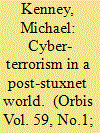

|
|
|
|
|
| Summary/Abstract |
Recent cyber-attacks such as Stuxnet and Anonymous’ increasingly aggressive digital activism have rekindled fears that cyber-terrorism is an imminent threat. However, the concept remains poorly understood. Confusion over cyber-terrorism stems, in part, from recent attempts to stretch the concept to include hacktivism and terrorists’ use of the Internet to facilitate conventional terrorism. Although the United States and other countries have experienced thousands of cyberattacks in recent years, none have risen to the level of cyber-terrorism. This article seeks to dial down the rhetoric on cyber-terrorism by explaining how it differs from cyber-attacks, cyber-warfare, hacktivism, and terrorists’ use of the Internet. The most immediate online threat from non-state terrorists lies in their ability to exploit the Internet to raise funds, research targets, and recruit supporters rather than engage in cyber-terrorism. Cyber-terrorism may well occur in the future, but for now online crime, hacktivism, and cyber-warfare are more pressing virtual dangers.
|
|
|
|
|
|
|
|
|
|
|
|
|
|
|
|
| 3 |
ID:
148069
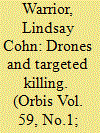

|
|
|
|
|
| Summary/Abstract |
There is widespread interest in how armed drones are used, how targets are chosen, and what frameworks of legality and political accountability exist. Less addressed is how use, targeting, justification, and accountability affect the people and the organizations being asked to operate the drones. This article examines the costs to the operators and the military organization of increased reliance on drones. It argues that the government and the public need to come to terms with the human costs—both foreign and American—of increased use of unmanned systems. It concludes that the government needs to find a way to make its employment of drones transparent and accountable enough that it will not harm the overall well-being, morale, and loyalty of the force.
|
|
|
|
|
|
|
|
|
|
|
|
|
|
|
|
| 4 |
ID:
148065


|
|
|
|
|
| Summary/Abstract |
More than three after the beginning of the Arab Awakening, it appears that the upheavals have, by and large, left the Gulf monarchies intact. While several dictators have fallen— from Ben Ali in Tunisia, Mubarak in Egypt and Gaddafi in Libya to Saleh in Yemen— monarchies across the region have shown considerable survival skills. But is this purported resilience likely to last even as the Arab Awakening continues to shake the Middle East and North African (MENA) region, or are the monarchs next in line now that the “presidents for life” have met their demise? This article explores the various ways in which Gulf monarchies have experienced political and social mobilizations associated with the Arab Awakening and then analyzes the characteristics that have allowed these countries to weather the storm, focusing on both pre-existing structural and cultural factors, as well as political responses to the unfolding regional protests.
|
|
|
|
|
|
|
|
|
|
|
|
|
|
|
|
| 5 |
ID:
148068


|
|
|
|
|
| Summary/Abstract |
In just the last ten years, a growing number of states have sought to join the race to develop and sell ever-more sophisticated drones on the global market. While today the market remains stratified between makers and takers of drones, the gradual emergence of a drones arms race will have some important and potentially dangerous consequences for the international system. The emergence of a race for drones will reshape long-simmering conflicts and rivalries around the world in three ways. First, the proliferation of drones will reset the rules and norms governing surveillance and reconnaissance. Second, drones will become increasingly useful to governments in testing the strategic commitments and the nerves of their rivals. Third, the worldwide proliferation of drones will multiply the risks of conflict spirals stemming from accidents or hijacked drones. Given these risks, Washington’ should take a leading role in slowing the global race for drones and in developing strict legal and normative mechanisms to govern drone usage and sales in the future.
|
|
|
|
|
|
|
|
|
|
|
|
|
|
|
|
| 6 |
ID:
148067
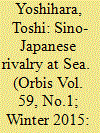

|
|
|
|
|
| Summary/Abstract |
This article contends that as Japan weakens relative to China it must think creatively about blunting key components of China's military strategy, particularly in the maritime domain. To advance this argument, this study samples recent Japanese threat perceptions of China; assesses the growing Sino-Japanese military imbalance; illustrates some asymmetric responses that may help Japan exploit its geographic advantages while competing more effectively; and identifies the risks to the proposed countermoves against China's challenge. The bottom line is that if Japan hopes to stay in the game, it must employ its military power imaginatively, making the Asian seas and airspace less and less hospitable to Chinese forces as they turn seaward.
|
|
|
|
|
|
|
|
|
|
|
|
|
|
|
|
| 7 |
ID:
148063
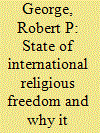

|
|
|
|
|
| Summary/Abstract |
One of America's—more precisely, one of Philadelphia's—greatest contributions to the world is freedom of conscience, the idea that people should be free to practice their religion—or not to practice at all. Today, as ISIS gives people the choice to die or convert, while others in various parts of the world flee for their lives because of different varieties of religious intolerance, one of the leading advocates of international religious freedom reports on the state of religious freedom in the world.
|
|
|
|
|
|
|
|
|
|
|
|
|
|
|
|
| 8 |
ID:
148064


|
|
|
|
|
| Summary/Abstract |
The history of great power conflicts waged by maritime/island powers clearly shows the criticality of supporting continental allies with a ground force commitment. Now is the time to establish a credible series of alliances in Europe and Asia—even though it is a moment of economic retrenchment and great power peace. These alliances need not be costly, but will provide deterrence in the near term and a hedge in the long run against future great power conflict—conflicts that will be waged not just in the air, on the seas, and in cyberspace, but on land as well.
|
|
|
|
|
|
|
|
|
|
|
|
|
|
|
|
|
|
|
|
|